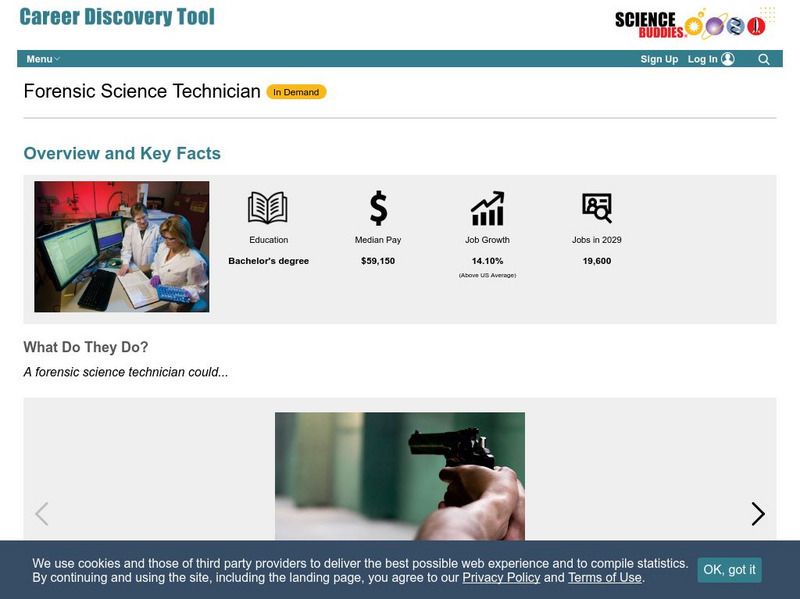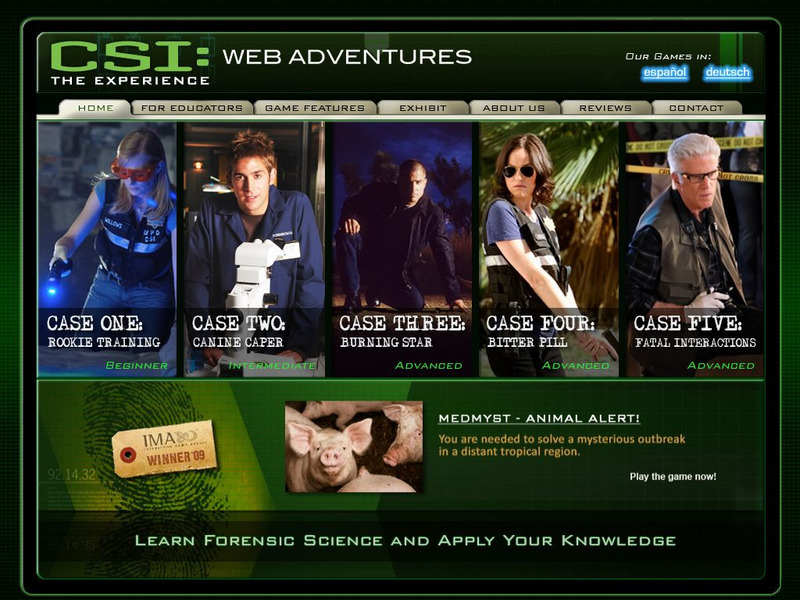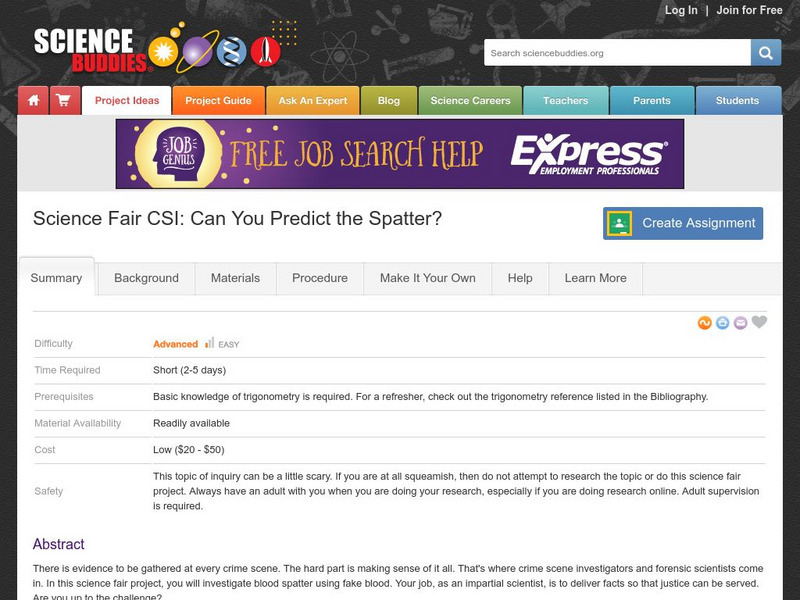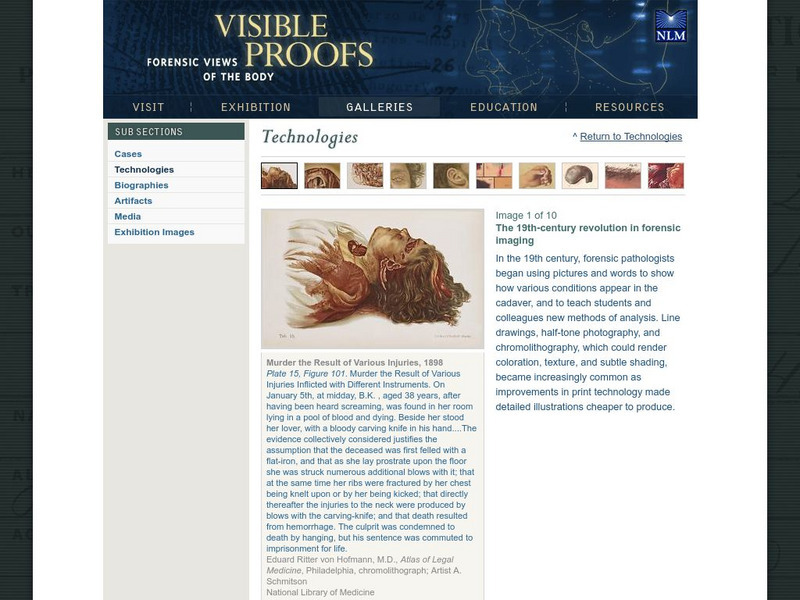Hi, what do you want to do?
Curated OER
DNA: The Human Body Recipe
Students describe DNA and the roles in which engineers are involved with the human body. In this DNA lesson students participate in a class demonstration.
Curated OER
Human Fingerprints: No Two the Same
Sixth graders explore scientific observations by analyzing a group of data. In this fingerprint identification lesson plan, 6th graders identify the reasoning behind fingerprinting and create their own ink fingerprints. Students discuss...
Curated OER
Cracking the Genetic Code
Students investigate different purposes for manipulating DNA. After reviewing the structure and functions of DNA, students explore topics related to the use or manipulation of DNA and the potential benefits and problems, later making a...
Curated OER
Get a Life!
Students read a New York Times article associated with the issue of the decoding for genomes, the creation of life in scientific laboratories and various genetic engineering topics. They present speeches of the pro's and con's of these...
Curated OER
The Mysterious Tragedy at Lake Nyos
Students present a convincing explanation of the Lake Nyos event and propose a solution to prevent future tragedies at central and western African lakes.
Curated OER
What Is It?!
Working individually or in groups, 4th graders are presented with unusual or at least unfamiliar objects and are asked to speculate on what they are and/or how they are used. The intention is to get students to make careful observations...
Curated OER
Bones and Math
students identify and explore the connection between math and the bones of the human body. Students collect data about bones from their classmates and from adults, apply formulas that relate this data to a person's height, and organize...
Curated OER
Potato Launcher Energy Lab
Students investigate conservation laws using a potato launcher. In this physics lesson plan, students measure angles, time and distance of the potato. They discuss applications of experiments like this.
Curated OER
DNA-a Molecular Identity
Young scholars explore about what DNA is and several different DNA typing techniques. They examine three different situations where DNA typing was used to carry out justice. Students also identify and evaluate different uses of DNA...
Curated OER
Who's the Father?
Students analyze gels to determine parentage in this lesson about scientific evidence, investigation, and DNA concepts. The lesson includes a pre-activity worksheet, a final individual assessment, and student handouts for in-class...
Science Buddies
Science Buddies: Career Profile: Forensic Science Technician
With the advent of many crime-solving television shows, there is increased interest in the career of forensin science technician. Read this Science Buddies career profile to find out all the kinds of things the forensic scientist gets to...
Read Works
Read Works: Focus on Scientists
[Free Registration/Login Required] An informational text about different types of scientists including: an inventor, a forensic scientist, an astronomer, a primatologist, and more. A question sheet is available to help students build...
Other
American Academy of Forensic Science: Choosing a Career
What is forensic science? What do forensic scientists do? What's a forensic scientist? This complete site answers these questions and provides a wealth of information about the field of forensic science.
Georgia Department of Education
Ga Virtual Learning: Forensic Science
In this comprehensive learning tutorial you will be provided with a brief introduction to Forensic Science and the history of Forensic Science. You will explain the different specialty areas of a forensic laboratory and discuss the...
Natural History Museum
Natural History Museum: On Maggots and Murders: Forensic Entomology [Pdf]
Five-page article explains how forensic scientists, when investigating crimes, analyze maggots and blowflies to determine approximate times of death.
Virtual Museum of Canada
Virtual Museum of Canada: Virtual Exhibit on Forensic Science
Discover the components of forensic science. There is also a link to a simulation in which you can apply your skills to solve a crime.
Rice University
Rice University: Web Adventures: Csi: The Experience
Based on the CSI television show, this series of four role-playing games helps students learn the scientific method and try their hand at solving crimes. Discover if you have what it takes to be a forensic scientist.
Science Buddies
Science Buddies: Science Fair Csi: Can You Predict the Spatter?
There is evidence to be gathered at every crime scene. The hard part is making sense of it all. That's where crime scene investigators and forensic scientists come in. In this science fair project, you will investigate blood spatter...
PBS
Pbs Teachers: Dead Men's Tales: Splatter Spread
Emulate the work of a forensic scientist by observing the relationship between scatter and distance. Assemble a projectile-hurling device called a potato cannon and analyze the spread pattern of paint soaked projectiles.
TED Talks
Ted: Ted Ed: Early Forensics and Crime Solving Chemists
In a CSI age, we take forensic science for granted. New York did not have a medical examiner or forensic toxicologist until 1918, whose eventual arrival changed the landscape of crime investigation forever. Deborah Blum prompts the TED...
PBS
Pbs Teachers: Dead Men's Tales: Inferring Height From Bone Length
Explore the work of forensic scientists by inferring an individual's height from the length of certain long bones. Create bone/height relation charts and measure length using metric units. This activity was created to be used with the...
National Institutes of Health
National Library of Medicine: Visible Proofs: Forensic Views of the Body
Students learn about the history of forensic medicine. Learners examine significant cases, technologies, and people that have had an influence on the history of forensic medicine. Educational activities are also included.
Indiana University
The Case of the Missing Computer Chip
Have your teams of students solve the simulated crime scene using clues presented in this thorough forensic lesson plan.
National Institutes of Health
National Library of Medicine: The 19th Century Revolution in Forensic Imaging
In the 19th century, forensic pathologists began to use words and pictures to describe cadavers and to teach using cadavers in the classroom. See a number of interesting photos of various crime scenes on this interesting site.



















![Natural History Museum: On Maggots and Murders: Forensic Entomology [Pdf] Website Natural History Museum: On Maggots and Murders: Forensic Entomology [Pdf] Website](https://static.lp.lexp.cloud/images/attachment_defaults/resource/large/FPO-knovation.png)








